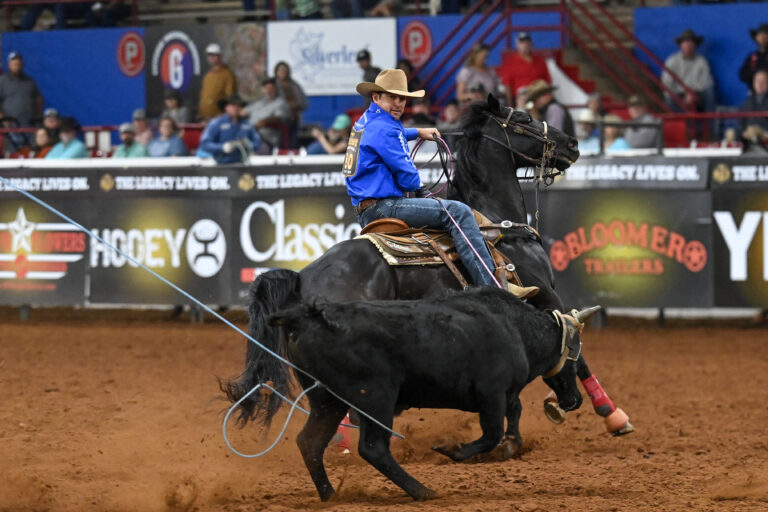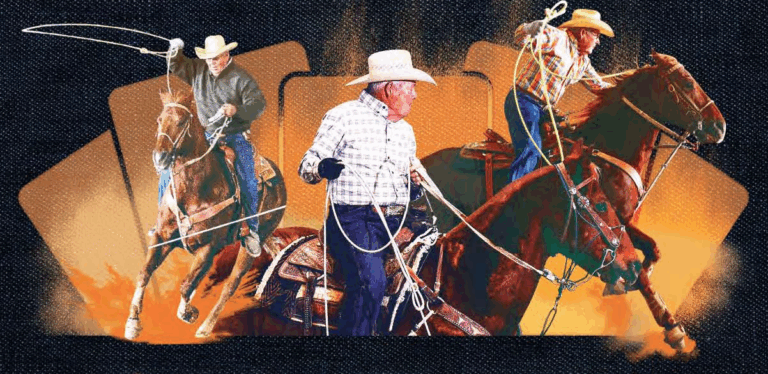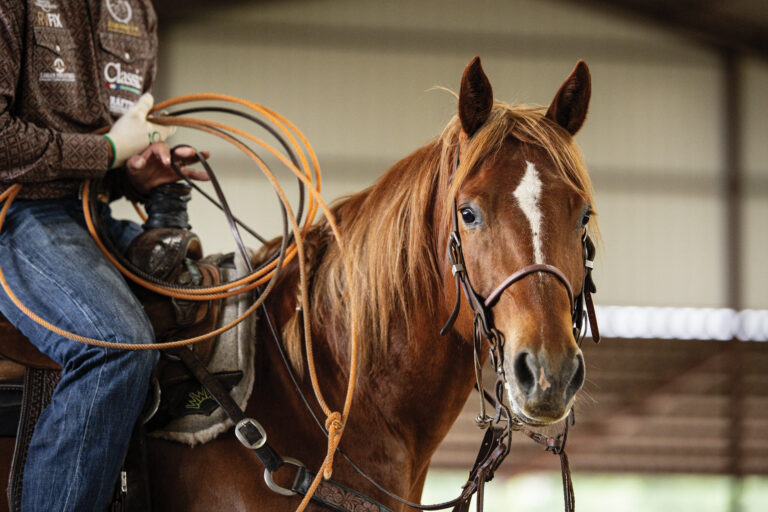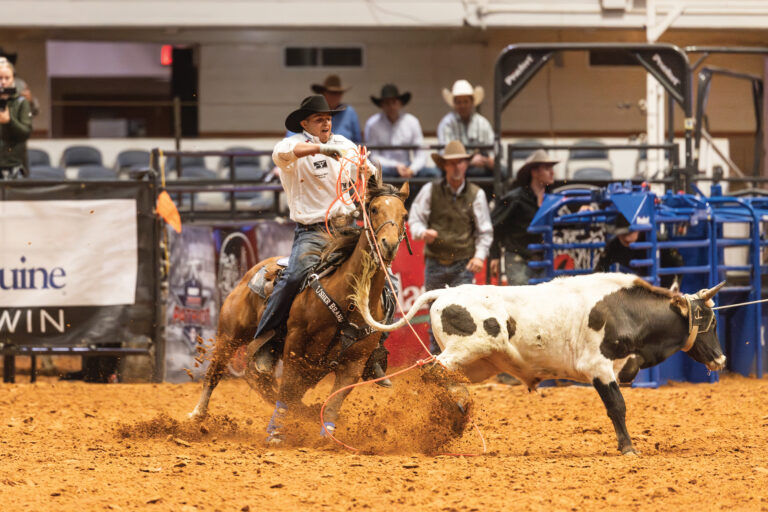Team roper Jeff Busby, 55, of Brock, Texas, spent his early years chopping weeds in cotton fields for $1 an hour. As an engineer in his garage some years later, he began what would become Av-DEC, a company that specializes in anti-corrosion aviation technologies and caters to the needs of individuals flying personal aircraft, businesses maintaining their commercial fleets, and even the U.S. military, which readily incorporated Av-DEC’s well-tested products into its manufacturing process.
In addition to significant success in aerospace engineering, Busby, with his wife Andrea, owns and operates Busby Quarter Horses in Millsap, Texas, where they raise and train team roping and barrel horses, featuring their standing studs, Blazin Jetolena and Blazin Honor, as well as run cattle. Andrea’s is a recognized named in the barrel racing arena and she was competing in San Antonio, not quite one year ago, when she got the news.
“I just started bawling right there in the alleyway.”
Jeff had cancer.
The Busbys went to work finding a dream team of doctors in Fort Worth. The type of cancer Jeff had—squamous cell carcinoma of the throat—was curable, but the treatment would be brutal. They were given an 80-percent chance of survival, and that’s where they set their sights.
Andrea, who was a nurse prior to marrying Jeff, devoted herself to Jeff’s care from the get-go—a decision that would earn her the endearing nickname of “Nurse Ratched” before too long.
To prepare for the 35 radiation treatments and six rounds of chemotherapy, surgeries were planned in March to remove all of Jeff’s bottom teeth and some of his jaw, and to insert a feeding tube that would be necessary when the effects of the radiation would prevent Jeff from swallowing. And that was only the beginning.
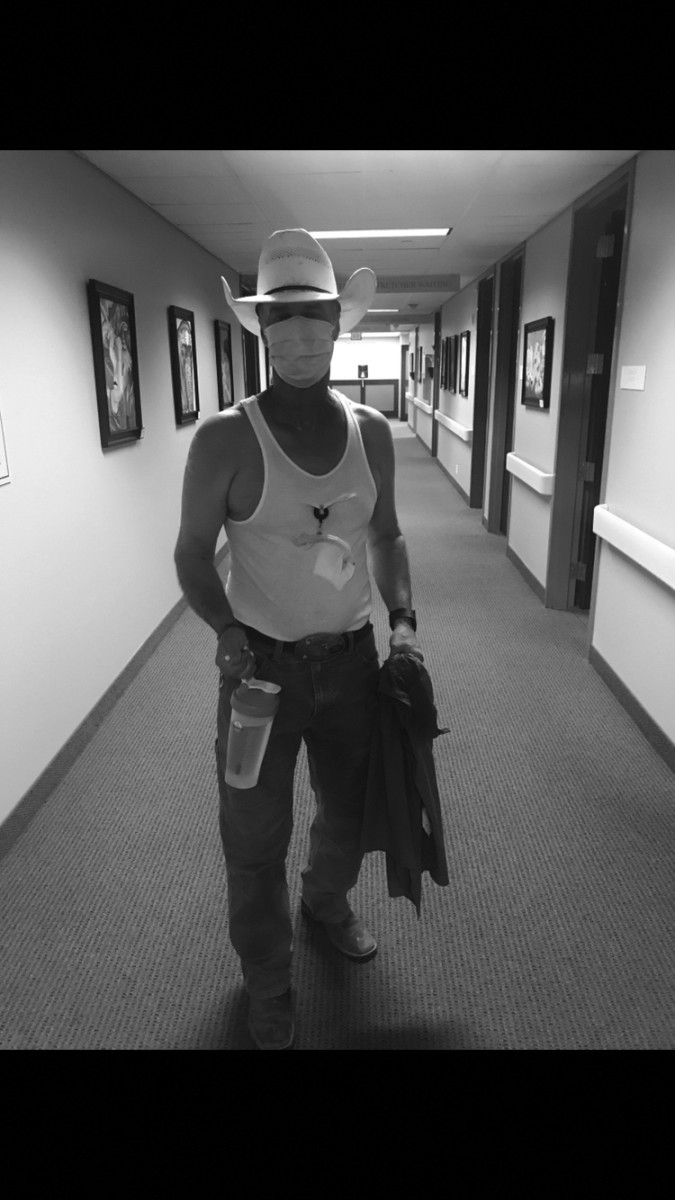
Andrea’s account of Jeff’s battle includes minute details like which medications Jeff was on during which week of his therapy and how he reacted to each of those medications progressively. She was with him in their home, where they would return after their daily hospital visits, and she was with him for endless treatments and appointments. In his functioning hours, she would cater to his needs, like making him meals he could swallow and stomach, while, when he would crash, she would design inspiration boards to keep Jeff motivated, and call upon friends for much-needed advice and strength.
“It’s kind of hard to see it at the time, but God just puts things and people in place,” Andrea marveled. “We would not have gotten through this without our faith and without the people we had around us who had faith, who held our hands through it.”
Jeff agrees, though his account of standing toe-to-toe with cancer is more big-picture. Often times, he doesn’t actually recall many of his own harrowing moments until Andrea recounts the story back to him—a phenomenon that may simply be the result of being prescribed copious amounts of pain medications, or the hand of something much greater … or both.
“I remember it very vividly when she brings up the hell we lived through,” Jeff explained, “but it’s like somehow something’s protecting me from dwelling on it.”
Not dwelling on it was a large part of Jeff’s approach throughout his treatments, which he refers to as “mental warfare.”
“I thought I might die,” he admitted, “but I never worried about dying. I never let it creep into my mind—what’s going to happen if I’m not here—because I couldn’t have any weakness in my mind that I wasn’t going to make it.”
Andrea, on the other hand, certainly worried about it, particularly when, after completing all of his treatments, Jeff was rushed to the emergency room for an infection that was developing at the site of his feeding tube insertion. The effects of the radiation and chemotherapy at this stage meant Jeff could barely tolerate swallowing or keeping much down, and that his resources for fighting off infections had been severely depleted. He was losing weight at a rapid pace and when he was finally released from the hospital some eight days later, he weighed a mere 149 lbs.
“Not the weight-loss plan you’d recommend for someone,” Jeff joked.
“I didn’t think he was coming out of the hospital,” Andrea remembered of that post-treatment scare. “I would lay there in my little cot and have this argument with God: I don’t want to lose him. Now, I keep saying it was God who was so faithful in the hospital. So many times, He just answered our prayers.”
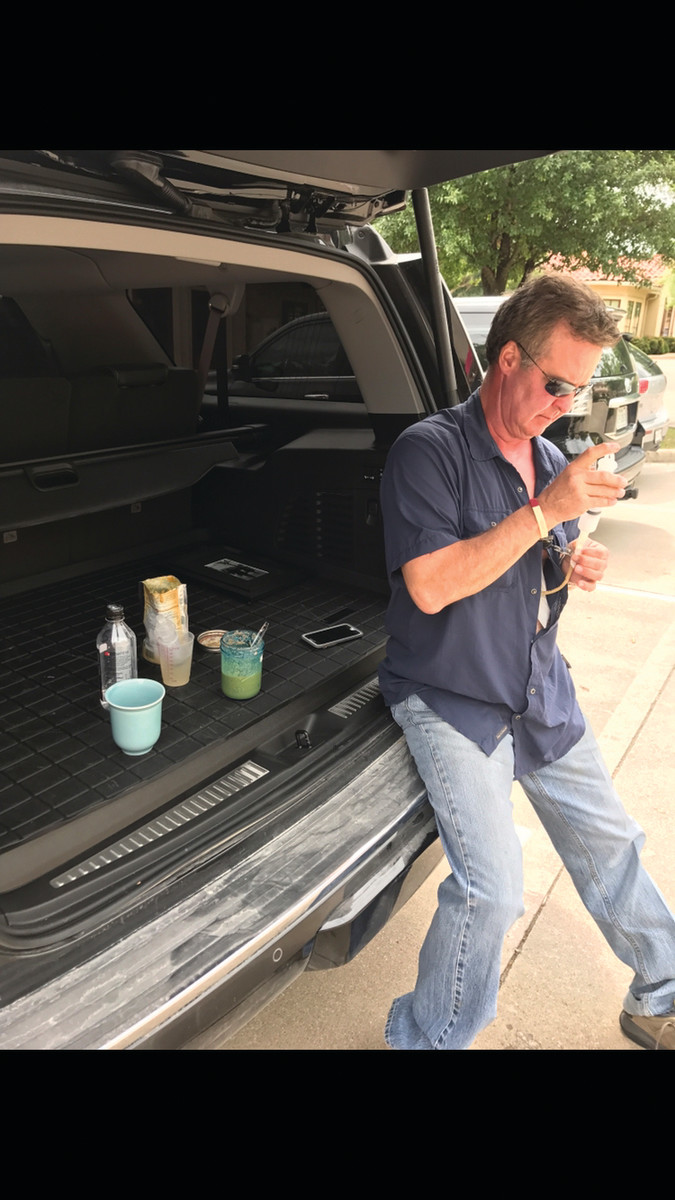
Growing up in the Texas panhandle town of Slaton, near Lubbock, Jeff’s brother-in-law introduced him to calf-roping, which his father allowed for the simple belief it would keep Jeff out of trouble. But after a few months of jumping off a horse that never really stopped and running down the rope to where a wild brahma-cross would come and meet him halfway, Jeff turned his attentions to team roping, and staying on his horse.
In college, with the aid of a professor who thought better of Jeff’s ambitions to be a veterinarian, Jeff discovered the engineering lab. He rodeoed at South Plains Jr. College before pursuing his degree from Texas Tech, where he’d volunteer for the rodeos with no less than four mechanical pencils in his shirt pocket—a sure sign he’d be returning to the lab post-rodeo.
Following graduation, Jeff pursued his engineering career with Exxon, followed by General Dynamics, which landed him in Fort Worth, amidst myriad roping events and opportunities like the Coors Ropings, the Bud Light Ropings, and even the start-up of the USTRC. In 1992, Jeff was making $34,000 at General Dynamics when, in one month, he won $6,200 and a USTRC saddle from the Lazy E.
“Those were change-of-lifestyle type numbers,” Jeff recalled. “I could afford a trailer with a full top instead of a half-top stock trailer, which is what I used to college rodeo.”
That kind of money was in line with Jeff’s goals at the time: Two horses to rope on, five acres, and a few practice steers. But by the end of the year, Jeff’s winning streak was long over and his dad’s advice to rope for fun instead of money was beginning to make sense, particularly on paper. He put his mind to his professional work, and in 1997, began his aerospace engineering start-up, Av-DEC, a venture that has allowed him to meet those original goals, and more.
“You’ve got to be your own advocate,” Jeff asserted. “Your product isn’t any good unless you can sell it.”
It’s a belief that applies to both his business practices and his approach as a cancer patient. On a few occasions in the hospital, Jeff and Andrea each had to be staunch defenders of Jeff’s well-being. Despite receiving what Jeff considers to be the best care, as they say, the devil is in the details, which can sometimes be overlooked by even the most well-intentioned nurses and technicians. Jeff made sure to ask lots of questions as he headed into various procedures, while Andrea maintained a spreadsheet of data with Jeff’s medications, dosages, and other notes.
Also, Jeff didn’t complain. Not through the surgeries, the radiation, the chemotherapy, the post-treatment scare; not any of it. Not only did he not complain, but he was—and remains—grateful.
According to Jeff, through all of it, he couldn’t reason how God might be willing to bless him with healing if he couldn’t advocate his faith in God’s plan.
“When I’m praying and thanking God,” Jeff said, “I know that His healing might not be for physical healing to turn me back to the way I was before. It might be for spiritual healing. But, I’m thanking God for the challenge because spiritually and mentally, it’s making me who He planned for me to be.”
The challenges Jeff has faced and will continue to face as he learns to live with the aftermath of cancer treatment are not to be minimized. Even at 6.5 months cancer-free, Jeff was seeing a doctor no less than four times each week for check-ups and CT scans and unpleasant recovery therapies like electrical stimulation shock therapy to help him recover the ability to use his tongue as he did before. From start to finish, it is a process that requires a literal army, even when God is in on the fight, and there is research to prove it.
“My doctor and nine other colleagues,” Jeff posited, “collected 12 years of data from 1994 to 2006 on single males that had throat cancer at their North American cancer centers. Of all the males without a support system, there was not a single survivor 24 months after treatment. Zero.”
Jeff and Andrea’s concentration on the initial 80-percent chance-of-survival was so focused that they had given scant consideration to the remaining 20 percent—the one in five patients who don’t survive.
“That’s the significance of Nurse Ratched,” Jeff revered. “It is huge. The doctors were recommending things be done, and there were two of us trying to do it, but even with me and my full-time wife, there were still things to be done. There’s no way anybody could do it physically, much less mentally, to keep the strength to do it without a support system.”
It’s a fact that has Jeff and Andrea looking into ways to offer such support to other cancer patients. Jeff knows well the impact of the community around the patient, and is hoping to return the favor of the outstanding support system he was blessed with.
One day this past summer, when Jeff was feeling particularly thankful for Nurse Ratched, he and a trusted employee stopped in at the local florist and planned to have his and Andrea’s home decorated for the holidays come November.
“My doctor said to me, keep planning,” Jeff revealed. “Keep your plans for six months from now. Keep your plans for Christmas. Keep your plans for your next big vacation. Just keep planning.
“I wanted to do something for Andrea because I love her so much, because she’s so significant. So, I bought all those flower arrangements and I scheduled it for a day or two before Thanksgiving so it would be done before we left for Arizona. Because we were going to Arizona.”
And they did. During his treatments, Jeff had parked his dummy out on his back patio where he could see it.
“I might only rope it three or four times, then I’d have to go back in the house,” Jeff admitted, “but I would get out there.”
His persistence paid off, too. Labor Day weekend, Jeff managed to enter in his first post-cancer jackpot in Kremmling, Colorado, as a 5-heeler, though he’s taken to heading, too, lately.
“I was 6-point-something seconds with someone and actually got the saddle horn and got dallied,” Jeff recounted.
The team took fast time for the whole jackpot, which lasted another two days. And though the jackpot was on the small side, the victory was sweet for Jeff, and hard-won, too.
“If Andrea had been there the first day, I wouldn’t have gotten to go back the second or third day. Nurse Ratched would have had my ass at home.”
Jeff didn’t win anymore at that roping and his heat tolerance was minimal thanks to the effects of the radiation, but with one jackpot down and a check for fast time, he could focus on the USTRC Cinch National Finals in Oklahoma City, where he and Andrea would be entered together for the first time ever.
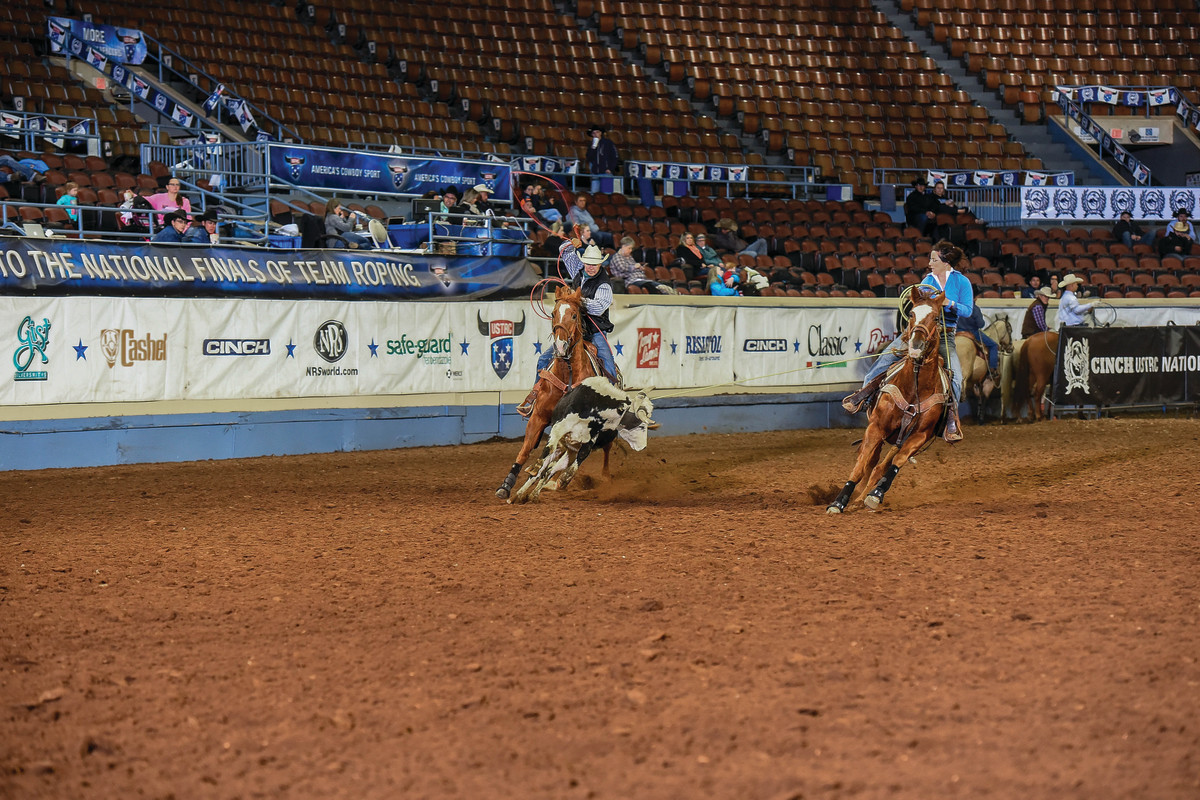
Prior to Jeff’s diagnosis, Andrea was squarely focused on her barrel racing, but with the news came a fresh viewpoint.
“Everything gets pulled back into perspective,” Andrea said. “Life’s little worries become pretty insignificant.”
But what did become significant to Andrea was cherishing her relationship with her husband, right from the household messes that used to drive her crazy to the roping arena, and it became her secret plan to learn how to rope and surprise Jeff with a new roping partner when he was ready to return to the arena.
The plan didn’t work quite like she thought it would since being Jeff’s primary caretaker required far more time and much less sleep than originally anticipated, but when Jeff started recovering, Andrea made good on her promise to learn how to dally.
“The first time we ever entered, we were 8.49 seconds on the first steer Andrea ever roped for me,” Jeff said of their go at the 2017 US Finals. “We didn’t win a damn thing, but it was a huge victory.”
The couple roped in Arizona and the WSTR Finale in Las Vegas, as well. Andrea’s not quite ready to turn in her barrel horses, but she and Jeff seem to have zero intentions of letting any opportunities to enjoy life together pass them by.
“It’s been a blessing,” Jeff imparted, as he considered how his relationships with Andrea, and God, too, were affected. “At the time, I didn’t think my relationship with my wife or the Lord could be any stronger than before I went through cancer, but the #1 thing I’ve gotten from cancer are these relationships.”
And for Jeff, that’s what this journey has truly been about: Receiving.
“The part that’s about Jeff and Andrea Busby, God gave us the strength to do it. He blessed us with healing. But it’s not about us. We did the things that had to be done and made the decisions that had to be made, but, you know, God’s the one that gives us that strength and gives us that wisdom. We just have to act on it.”





